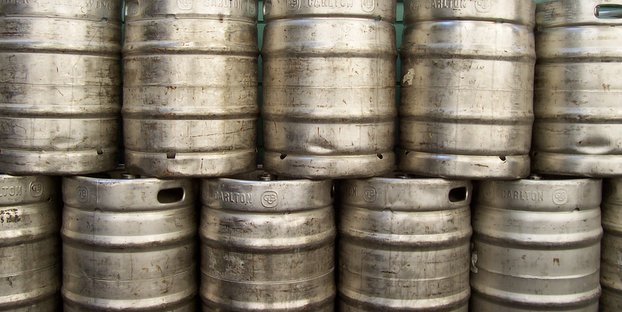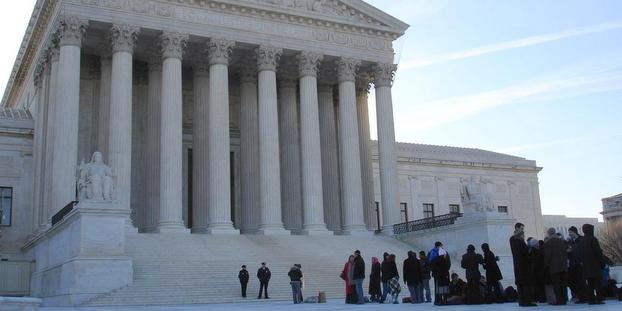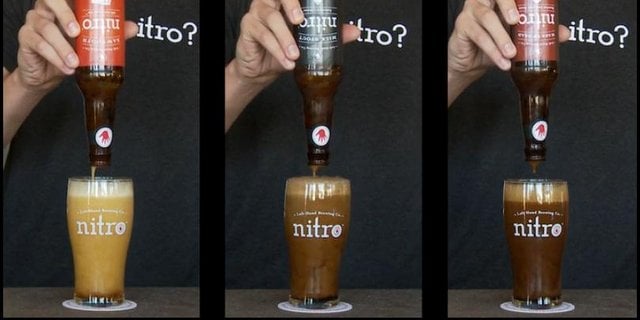With tons of contacts to meet and plenty of unique beers to taste, the Craft Brewers Conference and BrewExpo America (CBC) can be a lot of fun, but it’s a good idea to remember that craft beer is also a business. With legal issues popping up, the CBC launched a valuable presentation on trademark and copyright law that offered a sobering look at the complicated ins and outs of today’s small business climate. If you couldn’t make it out to D.C. this week for the CBC, or just couldn’t make it out of your hotel room after a long night of networking, don’t worry — Craft Brewing Business has your back.

As the potential liabilities in terms of trademarks, copyright, fair use and the like rattled off in Ballroom C of the Walter E. Washington Convention Center, you could see the attendees slightly react, as if to say “Hmmm, I’m not sure we’ve done that” or “Uh oh.” Mark Traphagen of Traphagen Law PLLC in Washington, D.C., was doing the rattling.
Before diving into the specific nuts and bolts of liability and law, brewers need to at least try and operate with a reasonable level of confidence and comfort: Scan Google; search beer community websites like Rate Beer and Beer Advocate; search the U.S. Patent and Trademark website; and think about hiring an attorney to do a deeper, thorough dive before cleverly branding your next seasonal Hop, Drop and Roll or Stout at the Devil because with so many new brewers entering the fray, the pun pool is dwindling.
Be thorough in your research
Take a look at the data from this earlier CBC presentation – each of these opened or planned breweries would carry its own trademark and also bring a litany of brand names and images to the table. And of those, what are trademarked or just copyrighted? Or both?
You also have to consider the meaning of the design. For example, if the image is a black cat, you have to search for “black cat” brands or trademarks, not just the image, as there could be a potential issue there.
Searches need to expand beyond the beer category these days as well. Traphagen said he’s seen a fair amount of disputes come from outside the beer category — from soft drinks and energy drinks and flavored teas. This wasn’t always the case, and it’s not so much that the law has changed, but just more and more companies are challenging and more courts are agreeing.
“It is more willingness by owners to assert rights across categories and more willingness from courts to see that overlap,” Traphagen said.
These are just concerns, though – things to consider and be careful about. It’s not a black or white issue in many these cases. It is essentially up to the court to determine if there is a reasonable confusion between cross-segment trademarks in order to justify the action.
In order to avoid this mess, apply for your trademark early. Traphagen emphasized that you do not need to be using the image or name currently in order to file, just the good faith intent to use. This helps because “it gets you in line, and if you succeed, your rights are backdated from when you applied, not when you started using it,” he said, noting that this is how large companies handle trademarks, and it would make sense for small companies to do the same. During this trademark filing, register for beer merchandise and any other associate services your brand might touch.
Protect your turf
Not all of this trademark talk is about making sure you are safe, it’s also about standing your ground. Do you see other brands infringing on your trademarks and copyright? Traphagen emphasized not just preventing exact duplicates, but also designs or slogans that might confuse customers into associating it with your brand. Over time, if other brands continue to crowd your trademark, your brand could erode, and you could potentially lose your enforcement power – unlikely, but possible.
Searches need to expand beyond the beer category these days as well. Mark Traphagen of Traphagen Law PLLC said he’s seen a fair amount of disputes come from outside the beer category — from soft drinks and energy drinks and flavored teas.“In general, a pattern of non-enforcement against infringers may eventually be considered an abandonment of trademark or a weakening,” Traphagen said. “Not responding to just a couple problems is not sufficient to lose rights. The law recognizes why every claim isn’t attacked. But if you don’t enforce at a certain level, your brand may be diminished because a number of others will have encroached on it.”
Continue to monitor the market and cull public databases to look for any designs or names that might be grounds for action. Keep in mind, anything you create, if distinctive enough, can be protected under trade dress, a legal term of art that generally refers to the visual appearance of a product or its packaging.
Trade dress can also be protected by copyright. Unlike trademark protection, the test is if observers would believe the design they are looking at is based on another design. Here is a place where a trademark claim might fail, but a copyright claim could succeed. Traphagen gave the example of the clock design on the iPhone, which was a copyrighted design of the Swiss Railway Network. Apple then had to negotiate a license to use it.
Here again, Traphagen said it was a good idea to register copyright, even though you don’t have to in order to defend it. The reason why is it gives you a leg up on imitators. “You don’t have to prove actual damages and may be able to transfer attorney fees to the other party if they lose. Helps resolve the issue quickly,” he said.
Don’t forget the overseas market
In case you missed it, craft brewing export numbers are up now too. Maybe your company is considering that overseas or cross-border move. Well, as you may have guessed, those U.S. trademarks you have are worthless in a foreign country.
“If you want protection there, you have to go through the steps separately over there, which usually means registering it,” Traphagen said. “The consequence is you may be the first in the world here in the U.S., but someone else may be the first to register it in China or the U.K., and they would have the rights in those countries.”
Beware of outsourced work
Breweries that have in-house staff handle creative work are usually in the best position because they have a much clearer idea of exactly where an idea or concept is generated from and owns that concept. Farming out design or marketing work can present a few additional trademark/copyright issues to watch out for:
“[The FTC] reiterated that their endorsement rules, intended to avoid deception, apply to social media and blogging. Even if the advertiser or brewer is not responsible for the overstatement by endorser, they will have legal responsibility if they don’t step in and clarify” — Mark Traphagen of Traphagen Law PLLC1. Get assurances that the work the company is doing is original and has not been copied, and if it has been copied, that they have obtained permission. If the company sends you something that infringes on someone else’s copyright, you will be the one liable.
2. Push for the transfer of photography copyright to your company. If you do not, the photographer will have the copyright and be able to do what they want with the photo. It will most likely cost extra, but is worth it to own all of your own concepts.
3. Be sure that the job descriptions of in-house staff outline the expected responsibilities to include the creation of these designs, logos, labels, etc., so that it is clear you are the employer for those tasks and the copyright it is yours.
Watch those endorsements
According to Traphagen, the FTC is getting more involved in social media as a form of endorsement. From as large as Justin Timberlake endorsing Bud Light to as small as a local beer blogger writing an endorsement about your local craft beer.
“[The FTC] reiterated that their endorsement rules, intended to avoid deception, apply to social media and blogging. Even if the advertiser or brewer is not responsible for the overstatement by endorser, they will have legal responsibility if they don’t step in and clarify,” Traphagen said.
After you send over some free samples to a reviewer, pay attention to what they say and be sure that they note that you sent them a free sample. That disclaimer is key and you need to make sure it is attached, as well as making sure any endorsement within the review doesn’t make a false claim.
Best practices and other tips from Traphagen’s presentation
• Limit liability on your website: If customers can upload to your site and you are hosting it, you could be liable for an infringement of theirs. You can limit that by registering with the copyright office as an Internet service provider, which is what you are doing if hosting uploads.
• Be careful if there are people in the photograph you are using because many states have laws that require consent of using living people they are being used for commercial purpose in any way. Some states carry these rights to the estate of the dead as well, California and Tennessee, for example.
• If possible, avoid loose claims in marketing like “local” or “natural” or other such adjectives unless you are extremely strong on that term and feel you can back it up.
• Be careful about mimicry. This may seem completely strange, but Vanna White won a suit against a company that used a robot to simulate her behavior on Wheel of Fortune. The court found that, yes, people would understand this robot was mimicking Vanna White, which gave her rights. Even a less classy person, like Snooki, can have their name or persona trademarked.
If the fear of having to interact with a cast member of The Jersey Shore doesn’t scare you into being more careful about your brand identity and business, then I don’t know what will. If you have any other trademark/copyright questions, feel free to email them to us at [email protected] and we will do our best to reach out to the right people and get it answered.






RT @CraftBrewingBiz: Craft beer trademark, copyright tips: Keep your brand free from disputes #CBC13 http://t.co/KmaLHBBg5P
RT @CraftBrewingBiz: Craft beer trademark, copyright tips: Keep your brand free from disputes #CBC13 http://t.co/KmaLHBBg5P